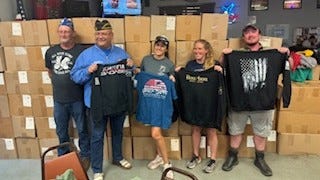
Veterans of Foreign Wars is among those organizations that continue to provide assistance to North Carolinians as they continue to recover from the effects of Hurricane Helene.
The Sept. 26 storm slammed into Florida before moving inland, where it left more than 220 people dead and devastated the western part of North Carolina with fast-moving flood waters. Less than two weeks later, on Oct. 9 Hurricane Milton ravaged Florida.
Following Helene, Mark Garduno, quartermaster general, VFW National Headquarters said two VFW posts – Post 5353 in Kernersville and Post 1142 in North Wilkesboro – immediately stood up, serving as collection and distribution points for supplies and continue to do so.
“Members of these posts concurrently were doing their best to provide supplies to remote or outlying communities which had not yet been reached by government agencies or the larger organizations,” he said.
Garduno retired from the Army as a chief warrant officer 3 in 2008 after a 20-year career as a personnel services technician.
Garduno was joined by retired Marine Master Sgt. and NC Senior Vice Commander Victor Letourneaut, Past State Commander Helen Nelson and Greg Stafford, VFW inspector general, on a trek through the western portion of North Carolina on Oct. 4, where they attempted to assess which posts were open and operating and if any had been destroyed.
“During this trip, we stopped by Morganton, Black Mountain, Ashville, and Waynesville,” he said. “The devastation is so widespread. However, there doesn’t seem to be a clear pattern. In some places, things seem completely destroyed, while nearby buildings and structures seem to have fared well.”
Garduno said he was most impressed to find that in times of crisis, veterans don’t wait for instructions, they simply get to work.
“They roll up their collective sleeves and do what needs to be done,” he said.
When Garduno left North Carolina on Oct. 7, VFW Posts 5353, 1152 and 5202 were operating as distribution centers.
“The Waynesville post was designated a World Central Kitchen and has the ability to “serve 300 hot meals daily to those in the community affected by the disaster and they also received a shipment of warm clothes and apparel that was donated by the Grunt Style Foundation,” he said.
That clothing will be distributed locally and to other nearby VFW posts serving as distribution centers, Garduno said.
While many organizations have provided lists of material needs for the people affected by the devastation, Garduno stressed that western North Carolina is a high-elevation region.
“The temperatures are falling quickly so it’s time to start sending warm clothes, knit caps, gloves, blankets and comforters,” he said. “Also, I noticed plenty of baby formula arriving by the caseload. What we’re forgetting to include are bottles too. Some families have lost everything or have been displaced from their homes.
"At a time when children are glued to video games and electronics, not much is available to help keep them entertained and their minds off the situation. Please consider sending toys, puzzles, simple sporting goods, coloring books and crayons.”
More than $200,000 in obligated monetary donations has been received by the VFW’s Department of North Carolina, according to Letourneaut.
“The Department of NC has been giving out up to $500 in grant money per application to help offset costs,” he said.
Both Garduno and Letourneaut said now is not the time to point fingers or place blame about how the federal government has responded to the storm.
“Our VFW members and Auxiliary stood up and started collecting supplies in their own posts and drove it up to Greensboro and volunteered numerous hours,” said Letourneaut. “Veteran organizations, like the VFW, have answered the call to be there for fellow veterans and members of our communities, that what we do, even though we are no longer wearing the uniform, We still serve.”
Reach Julia LeDoux at Julia@connectingvets.com.
